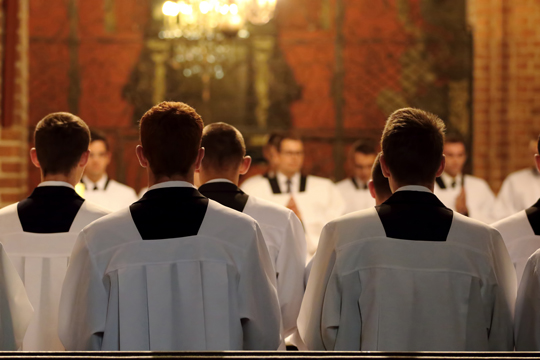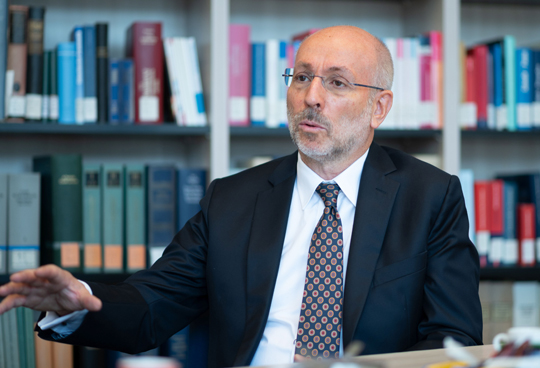Minister, Scientist, Manager
Freiburg, Sep 22, 2020
The Catholic Church is seeing fewer and fewer applicants who want to become priests. A discussion paper from the German Bishops’ Conference now proposes to eliminate many of the locations where priests are trained, trigging both opposition and debate. The decision would also have an impact on the Faculty of Theology at the University of Freiburg. Ferdinand R. Prostmeier is its dean and professor for New Testament Studies. Thomas Goebel spoke with him about priestly formation and university theology.
 A priest needs a broad portfolio of competencies including excellent knowledge in theology, communication skills, know-how in human resources management and business. Photo: wideonet/stock.adobe.com
A priest needs a broad portfolio of competencies including excellent knowledge in theology, communication skills, know-how in human resources management and business. Photo: wideonet/stock.adobe.com
Mr. Prostmeier, in view of the decreasing number of applicants, a working group of the German Bishops' Conference has recommended that prospective priests should only study at the theological faculties in Munich, Münster and Mainz. Freiburg would be eliminated. How do you regard the proposal?
Ferdinand R. Prostmeier: It is not fully developed and does not adequately take into account the situations of the various faculties. A sustainable and future-oriented concept is essential. In Freiburg we are talking to each other about it and see ourselves on the right track.
How many candidates for the priesthood are currently still studying at the various theological faculties in Germany?
In total 83, 17 of whom are in Freiburg, which amounts to 20 percent. It is quite surprising that Freiburg has not been included in the proposal.
Nevertheless, why are there so few candidates in Freiburg?
The decline in the number of candidates for the priesthood is not unique to Freiburg. It seems that the Church has lost its relevance among the population. There are issues where the Church could have shown its true colors more clearly in society. Let me give you just one example from recent history. Almost 40 years ago Pope John Paul II published his encyclical “Laborem Exercens.” It is about a just organization of work. As a church, we could and should have become more active in the whole area of the world of work, the organization of our work, including collective bargaining. So the decline also has an ecclesiastical and social history with many interwined aspects. It would be inappropriate to hold events such as the abuse scandal solely responsible.
In addition, the job description is changing. Fewer and fewer priests have to look after more and more parishes...
As a professor and dean, I experience candidates for the priesthood who want to become pastors. They then gradually discover what kind of work is coming their way - that is, essentially the management of a medium-sized company. Such prospects can also be daunting.
Should we therefore rethink the priest’s job profile?
Yes, including the training profile. Excellent knowledge of theology is indispensable, but it is not sufficient for the ministry as a priest or for other pastoral ministries. A priest needs communication skills; he must be familiar with human resources management and business. Even if you were to later hire a specialist for these areas, it would be bad if you showed no interest at all. Perhaps the seminaries could offer even more guidance and counseling.
And what can the Faculty of Theology offer to be more appealing to candidates for the priesthood, but also to students in general?
We offer not only the classic undergraduate courses, but also a range of Master’s level courses after the Bachelor’s degree. These include, for example, a Master’s degree in Religious Studies, a Master’s degree in Caritas Studies or our brand new program, a bilingual Master’s degree in Interdisciplinary Ethics, together with the University of Strasbourg and the Faculty of Medicine in Freiburg. We have a diverse setup and provide training for various fields of activity, for example in the field of bioethics. It is also relevant for local government. For a city like Freiburg, it is wise to have someone who, as a theologian and religious scholar, has been intensively involved in the coexistence of different religious communities. And finally, theological research and teaching is very diverse here, and the culture of discourse is traditionally very distinctive and dynamic. This is one of the advantages that Freiburg has as a scientific location.
 Ferdinand R. Prostmeier thinks that priests should delegate certain tasks to theologians with additional qualifications: Then they would be better able to “fulfill more of their ministry as pastors, instead of rushing from one meeting to the next.” Photo: Patrick Seeger
Ferdinand R. Prostmeier thinks that priests should delegate certain tasks to theologians with additional qualifications: Then they would be better able to “fulfill more of their ministry as pastors, instead of rushing from one meeting to the next.” Photo: Patrick Seeger
Does this mean that the Faculty of Theology in Freiburg is no longer dependent on the traditional core task of priestly formation?
I would not put it that way. I think one could agree that the study phase of priestly formation should not happen without Freiburg. Freiburg has a traditionally Catholic milieu on many levels. We have an international network, a high number of students and important doctoral programs. Conversely, with regard to foreign students, for example, priests from Asia, South America and Africa who do their doctorate with us, it is important that the academic sections of priestly formation are also located here. We want international and interdisciplinary exchange, also in the interest of the future priests themselves, who later on will not only be together with Catholics. If one wants to be more relevant again in society, one should also learn the ability to discourse on a scientific level and, not least, practice it for pastoral tasks.
So you are promoting priestly formation in Freiburg, but do not see your faculty threatened by the debate?
On the basis of the Concordat between the Vatican and Baden of 1932, the state of Baden-Württemberg is obliged to ensure the stock and provisions. I believe there is no other faculty in Germany that is as secure as the Freiburg faculty. The state government made it clear years ago that our Faculty of Theology is by no means exclusively dedicated to training priests and teachers. The Church and civil society have changed in such a way that other services are needed, for which we offer courses. And we want to bring the questions that arise from academic theology even more strongly into the university discourse.
Back to the priesthood, which is also discussed in university theology. Wouldn’t it also need more far-reaching reforms today, such as the priesthood for women and the abolition of mandatory celibacy?
It seems to me that these are highly charged questions in terms of ecclesiastical politics, which do not arise at the beginning. Instead, the beginning the question involves the understanding of service and church. One could, for example, think about how the leadership of a ministry unit should look like, whether everything should be done by the priest or whether certain tasks should be delegated, for example to theologians with additional qualifications in humanities, economics or law. Priests could then once again fulfill more of their ministry as pastors, instead of rushing from one meeting to the next.

